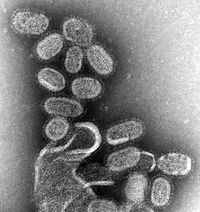
Photo from wikipedia
The rapid spread of COVID-19 requires better knowledge on the rate of coronavirus infections and coronavirus specific antibody responses in different population groups. In this work we analyzed changes in… Click to show full abstract
The rapid spread of COVID-19 requires better knowledge on the rate of coronavirus infections and coronavirus specific antibody responses in different population groups. In this work we analyzed changes in seasonal human coronavirus specific antibodies in young children participating in a prospective 3-year serological follow-up study. ABSTRACT Seasonal human coronaviruses (HCoVs) cause respiratory infections, especially in children. Currently, the knowledge on early childhood seasonal coronavirus infections and the duration of antibody levels following the first infections is limited. Here we analyzed serological follow-up samples to estimate the rate of primary infection and reinfection(s) caused by seasonal coronaviruses in early childhood. Serum specimens were collected from 140 children at ages of 13, 24, and 36 months (1, 2, and 3 years), and IgG antibody levels against recombinant HCoV nucleoproteins (N) were measured by enzyme immunoassay (EIA). Altogether, 84% (118/140) of the children were seropositive for at least one seasonal coronavirus N by the age of 3 years. Cumulative seroprevalences for HCoVs 229E, HKU1, NL63, and OC43 increased by age, and they were 45%, 27%, 70%, and 44%, respectively, at the age of 3 years. Increased antibody levels between yearly samples indicated reinfections by 229E, NL63, and OC43 viruses in 20–48% of previously seropositive children by the age of 3 years. Antibody levels declined 54–73% or 31–77% during the year after seropositivity in children initially seropositive at 1 or 2 years of age, respectively, in case there was no reinfection. The correlation of 229E and NL63, and OC43 and HKU1 EIA results, suggested potential cross-reactivity between the N specific antibodies inside the coronavirus genera. The data shows that seasonal coronavirus infections and reinfections are common in early childhood and the antibody levels decline relatively rapidly. IMPORTANCE The rapid spread of COVID-19 requires better knowledge on the rate of coronavirus infections and coronavirus specific antibody responses in different population groups. In this work we analyzed changes in seasonal human coronavirus specific antibodies in young children participating in a prospective 3-year serological follow-up study. We show that based on seropositivity and changes in serum coronavirus antibody levels, coronavirus infections and reinfections are common in early childhood and the antibodies elicited by the infection decline relatively rapidly. These observations provide further information on the characteristics of humoral immune responses of coronavirus infections in children.
Journal Title: Microbiology Spectrum
Year Published: 2022
Link to full text (if available)
Share on Social Media: Sign Up to like & get
recommendations!